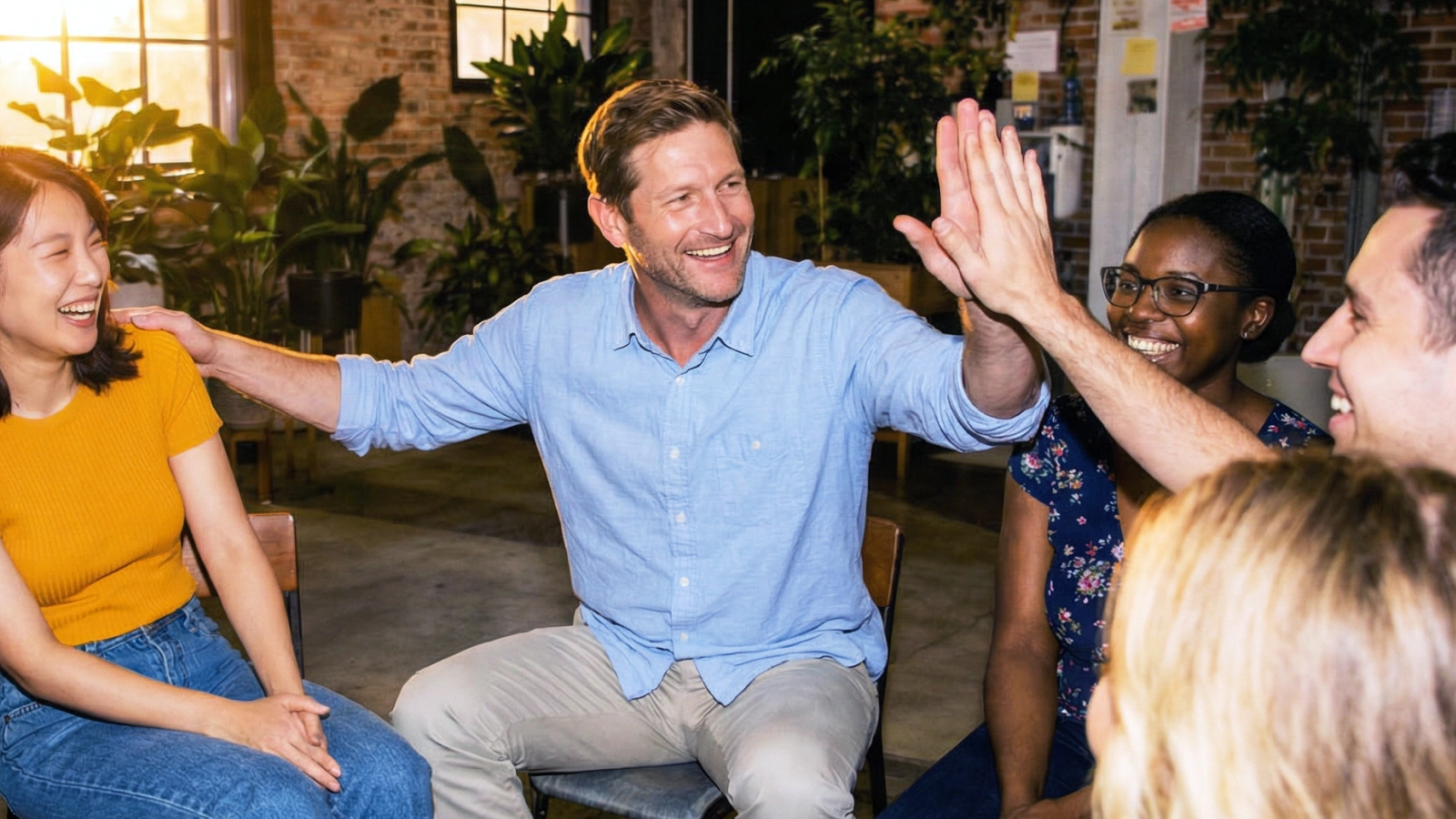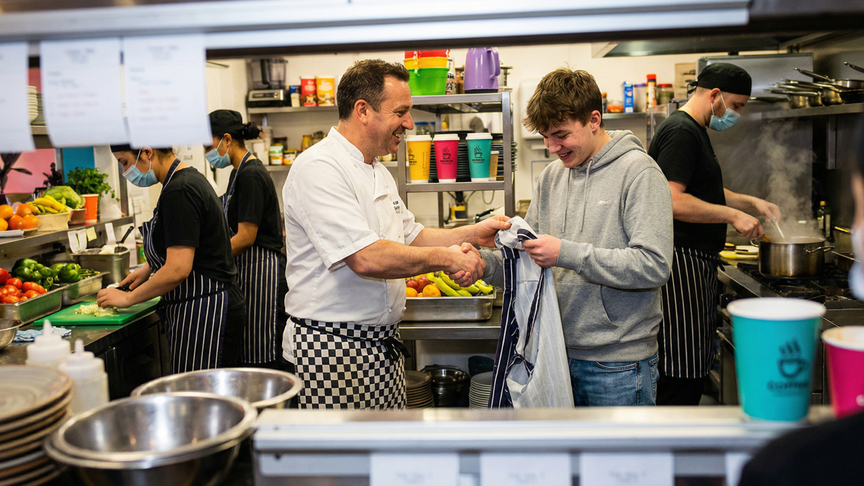Conviction, not credentials, will define the future of work and innovation, according to James Vyse.
All groundbreaking ideas are deemed unfathomable at some stage: the printing press, air-travel, artificial intelligence. Today, more than ever before, turning the impossible into reality is within reach for anyone bold enough to try.
James Vyse, CEO of deltaH Innovations and inventor of the world’s first self-cooling can, is one of those people. A former mixologist from Wales, he hadn’t a clue about science or engineering before he set out to turn the drinks market on its head.
Armed with sheer determination, a one-of-a-kind idea and a sense of urgency, he wound up inventing a product that can reduce its exterior temperature by 10 degrees in 60 seconds and drew the gaze of global beverage giants like Coca-Cola. Since launching, the ‘Cool Can’ has become more than a product; deltaH is already exploring medical and industrial uses.
“I didn’t go to school, so I just thought I could learn, especially in this world with AI and other kinds of technology at your disposal”, says Vyse, whose late-night experimenting soon became an obsession. “I researched science, chemistry, sustainability day and night and became obsessed,” he adds, noting that he tried countless prototypes during his discovery process.
“A couple of years later, we got there. I found a sustainable chemical compound and thought ‘I’ve got something here’. That’s when I incorporated DeltaH Innovations and found some crazy investors to back my idea, which back then was just that.”
The Cool Can went viral in March this year after raising £313,185 in crowd funding. It has since received and raised
The Cool Can exploded onto the scene earlier this year, raising £313,185 in crowd funding in addition to direct and angel investments after grabbing attention from international newspapers and industry insiders. It’s currently manufactured in the UK, but plans to expand internationally once the product comes to market due to the sheer demand it expects to generate. Though the timeline for an official launch has yet to be disclosed, it expects to distribute “millions, even billions” of cans in the near future.
Betting it all
DeltaH wasn’t Vyse’s first foray into entrepreneurship. Years earlier, he’d launched a direct-to-consumer cocktail company, a crash course in the realities of logistics and compliance.
“You think you launch a website and you’re suddenly a millionaire, but it doesn’t work like that. You have to learn everything about tax, recruitment and funding,” he says.
So when the inspiration for the Cool Can struck, he knew it wouldn’t be easy. Still, that didn’t stop him quitting his bartending job in London without a safety net. “I wouldn’t advise others to do it the way I did,” he admits. “I had rent to pay and no backup. But sometimes you’ve got to take the leap.”
That leap is now shaping an entirely new category in the beverage industry.
Fighting for support
Despite international attention, Vyse has been frustrated by the lack of support from the UK Government.
“We’ve applied for multiple [Government] grants and we’ve not won anything. Fortunately, between my success in my previous business and a small group of high net worth investors, we’ve been able to fund [the business] ourselves,” he says.
“If we produce this product in the UK, the boost to the economy would be phenomenal. But without funding, businesses are forced to look abroad.”
His frustration echoes a broader problem. Small and medium-sized enterprises (SMEs) account for 99% of all UK firms and 60% of private sector jobs, yet consistently face barriers to finance. “Ahead of the budget, worries about tax rises and weak incentives are widespread. Small businesses like Vyse’s crave targeted tax incentives or capital-grant schemes to unlock broader growth.
British Business Bank’s 2025 Small Business Finance Markets Report shows that smaller businesses generally invest less relative to turnover and have trouble accessing external finance, citing high cost of credit and risk aversion as key barriers. According to the British Chambers of Commerce, almost half of SMEs also struggle to access growth funding, relying instead on personal savings or high-interest loans.
“The lack of support for innovation is one of the reasons Britain risks falling behind,” Vyse warns. “If startups with global potential can’t find backing here, they’ll go elsewhere, and that means jobs and growth going elsewhere too.”
Building differently
Inside deltaH, Vyse has fostered a culture that mirrors his unorthodox path. His founding team was majority female, something he highlights with pride in a sector dominated by men. “Seeing young people join, grow into their roles, and find their strengths has been one of the most rewarding parts of this journey,” he says.
He also rejects rigid hierarchies. Vyse describes leadership as collaborative, saying his team works best when ‘everyone is on the same level.
That philosophy occasionally means colleagues push back on his wilder ideas. “I’ve been told to go back in my box more than once,” he jokes. But Vyse sees this dynamic – open debate, flat decision-making, space for young voices – as the future of leadership. It’s also a model that could help SMEs retain talent when they can’t compete with big-corporate salaries.
Retention is a particularly urgent issue. Employment Hero’s 2025 Inaugural Jobs Report shows that one in three UK workers is actively considering leaving their role within the next 12 months, with Gen Z and Millennials leading the charge. Vyse suggests SMEs must “be the place where people feel they can grow,” since many can’t compete on pay.
Conviction over credentials
For Vyse, his story is proof that the future of work won’t be defined by degrees or pedigrees. “I’m just an ex-bartender who refused to accept that I couldn’t learn,” he says. “So many people think of an idea and then talk themselves out of it. They think, ‘I couldn’t do that.’ But if you jump in headfirst, you’ll figure out how to swim later. That’s how innovation happens.”
It’s a philosophy he wants to pass on. Growing up on a Welsh council estate, Vyse knows how limited opportunities can feel. One of his long-term goals is to establish a fund for young entrepreneurs from disadvantaged backgrounds. “There are so many gems out there – kids who think they’ve got no chance. If I can use my success to give them a shot, that’ll be my legacy.”
For deltaH’s CEO, conviction will always outweigh credentials.
“We’re living through a revolution,” he says.
“Technology means the next breakthrough mind can come from anywhere, not just Cambridge or Harvard. What matters isn’t where you studied, it’s whether you’ve got the conviction to keep going.”
James Vyse’s five top tips on inventing a product
Solve a real problem, not an imagined one
Most inventions fail because they’re “clever,” not useful. If people don’t feel the problem you’re solving – if they aren’t frustrated, inconvenienced, or paying for a workaround – you’re building a curiosity, not a business. The best inventions start where people already have pain and spend money to fix it.
Protect before you preach
Don’t broadcast your idea until you’ve at least filed a provisional patent, NDA’d your partners, or documented your concept with date-stamped records. Ideas are cheap; protection buys you time to turn one into a defensible asset. But remember – a patent is only as good as your ability (and willingness) to enforce it.
Prototype fast, fail cheaper
Your first prototype should be ugly, functional, and honest. Every version after that should kill one flaw at a time. Don’t romanticise perfection – progress beats polish in the early stages. Physical prototypes are truth-serum: they expose physics, friction, and foolish assumptions.
Build allies, not audiences
You don’t need fans at first; you need collaborators – suppliers, engineers, investors, and early adopters who believe in the problem and want to help you solve it. A good partner multiplies your impact far more than a thousand likes on social media.
Persistence outperforms brilliance
Every inventor starts as an optimist and survives as a realist. There will be setbacks – failed tests, cash droughts, copycats, disbelievers. The only real differentiator is how many times you get back up with the same intensity. Grit is the currency that pays for breakthroughs.























